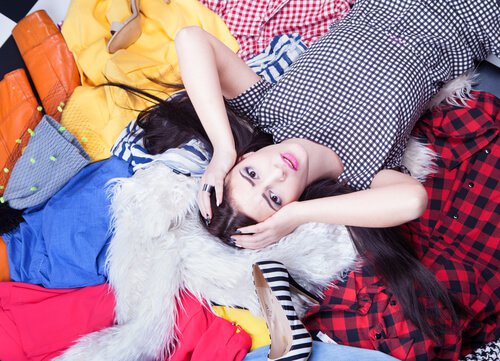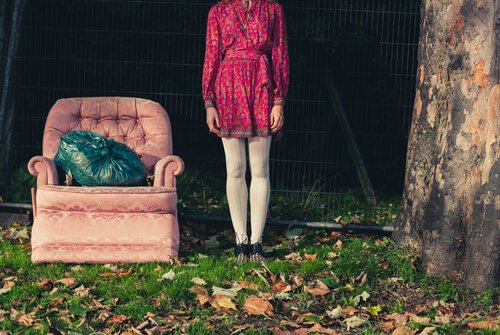Minimalism: Get Rid Of Unnecessary Things To Make Space In Your Mind

Look around you and count the things that you see… Do you feel like there are a lot of things that have piled up? More than what you really need?
Are you one of those people who carries an enormous purse that you have not seen the bottom of in a long time? Do you have clothes that you have not worn for more than a year? Kitchen utensils that you have only used one time?
We live in a world where it is normal for us to accumulate more objects than we need, from office materials to clothing and shoes, to make-up to tools…and the list goes on.
These belongings take up physical space in our homes, cause our closets, boxes, trunks, and shoe racks to overflow…But the worst thing is that they also take up our mental space and time, for we have to classify, order, or clean them.

But there is a life philosophy that can help you see and manage that accumulation in a different way — this is minimalism. Minimalism is not about having less, but about making space for what really matters.
What is minimalism?
Minimalism is a life philosophy that proposes the reduction of material objects that we possess to the bare minimum.
The idea is to live with the least necessary, which will be different for each person in their situation. The idea is to have fewer things in order to have more physical and mental space.
If we reflect on why we keep objects that we do not use, we will notice that there are many emotional reasons, as well as the typical “maybe I will need it some day.”
Pieces of clothing, gifts, cards, etc. that we cannot get rid of because they remind us of former times in our lives, as if the memories were stored in these material objects.
Minimalism is an exercise that helps us detach from material things, realizing that the memories live inside us, not in the objects.
The less you need, the freer you will be…
How to put minimalism into practice
Ideally, you start little by little, dividing up the objects by area and deciding what it is that you really need, which objects you are not sure that you need, and which you are sure you need to get rid of.
- In the kitchen: Which kitchen utensils have I not used for more than a year? Do I really use all of the spices that I own?
- In the closet: Which articles of clothing or shoes do I not care about anymore or have I not worn for more than a year?
- In the office: Do I have notebooks, old agendas, notes from years ago, or bric-a-brac that I practically never look at?

Or, turn your minimalist project into a challenge or competition with these examples:
Project 333
Project 333 encourages us to choose 33 articles of clothing (you do not have to get rid of the rest, just set them aside) and spend a while with just these articles.
By doing this, we will notice how little we can wear, and not just that, but also how much time we save on choosing what to wear when there are not as many things to choose from.
Minimalist competition
Or, partner up with someone else who is working toward becoming more minimalist, and turn your process into a competition.
The first day of each month, you will both have to get rid of one belonging; the second, two; the third, three, and so on, until the thirtieth day. Whoever is able to hang in there longer wins.
Once you have figured out which objects you can do without, you can donate or sell a lot of them to secondhand stores.
Benefits of minimalism
- It helps you keep your house organized and free of “junk.”
- We save time by not having to reorganize the closet, clean the silverware we never use, etc. Also when we have to decide what to wear.
- We learn to detach from material objects and recognize that true memories live within us.
- It makes us more open to the future by eliminating the attachment we have to objects from the past.
- It makes us freer: we have fewer burdens when we have to move or travel, which makes this easier.
- It makes us more aware of what we consume, with the subsequent savings, both for us and the environment.
- And, above all else, it helps us to be aware that what is really important is almost never material.
If you have ever felt yourself being overwhelmed by the things you accumulate, it has been hard for you to find something, or you have had the feeling that you waste a lot of time organizing or cleaning your belongings, I encourage you to try introducing this philosophy into your life. Minimalism is a direct path towards mental peace.
Look around you and count the things that you see… Do you feel like there are a lot of things that have piled up? More than what you really need?
Are you one of those people who carries an enormous purse that you have not seen the bottom of in a long time? Do you have clothes that you have not worn for more than a year? Kitchen utensils that you have only used one time?
We live in a world where it is normal for us to accumulate more objects than we need, from office materials to clothing and shoes, to make-up to tools…and the list goes on.
These belongings take up physical space in our homes, cause our closets, boxes, trunks, and shoe racks to overflow…But the worst thing is that they also take up our mental space and time, for we have to classify, order, or clean them.

But there is a life philosophy that can help you see and manage that accumulation in a different way — this is minimalism. Minimalism is not about having less, but about making space for what really matters.
What is minimalism?
Minimalism is a life philosophy that proposes the reduction of material objects that we possess to the bare minimum.
The idea is to live with the least necessary, which will be different for each person in their situation. The idea is to have fewer things in order to have more physical and mental space.
If we reflect on why we keep objects that we do not use, we will notice that there are many emotional reasons, as well as the typical “maybe I will need it some day.”
Pieces of clothing, gifts, cards, etc. that we cannot get rid of because they remind us of former times in our lives, as if the memories were stored in these material objects.
Minimalism is an exercise that helps us detach from material things, realizing that the memories live inside us, not in the objects.
The less you need, the freer you will be…
How to put minimalism into practice
Ideally, you start little by little, dividing up the objects by area and deciding what it is that you really need, which objects you are not sure that you need, and which you are sure you need to get rid of.
- In the kitchen: Which kitchen utensils have I not used for more than a year? Do I really use all of the spices that I own?
- In the closet: Which articles of clothing or shoes do I not care about anymore or have I not worn for more than a year?
- In the office: Do I have notebooks, old agendas, notes from years ago, or bric-a-brac that I practically never look at?

Or, turn your minimalist project into a challenge or competition with these examples:
Project 333
Project 333 encourages us to choose 33 articles of clothing (you do not have to get rid of the rest, just set them aside) and spend a while with just these articles.
By doing this, we will notice how little we can wear, and not just that, but also how much time we save on choosing what to wear when there are not as many things to choose from.
Minimalist competition
Or, partner up with someone else who is working toward becoming more minimalist, and turn your process into a competition.
The first day of each month, you will both have to get rid of one belonging; the second, two; the third, three, and so on, until the thirtieth day. Whoever is able to hang in there longer wins.
Once you have figured out which objects you can do without, you can donate or sell a lot of them to secondhand stores.
Benefits of minimalism
- It helps you keep your house organized and free of “junk.”
- We save time by not having to reorganize the closet, clean the silverware we never use, etc. Also when we have to decide what to wear.
- We learn to detach from material objects and recognize that true memories live within us.
- It makes us more open to the future by eliminating the attachment we have to objects from the past.
- It makes us freer: we have fewer burdens when we have to move or travel, which makes this easier.
- It makes us more aware of what we consume, with the subsequent savings, both for us and the environment.
- And, above all else, it helps us to be aware that what is really important is almost never material.
If you have ever felt yourself being overwhelmed by the things you accumulate, it has been hard for you to find something, or you have had the feeling that you waste a lot of time organizing or cleaning your belongings, I encourage you to try introducing this philosophy into your life. Minimalism is a direct path towards mental peace.
This text is provided for informational purposes only and does not replace consultation with a professional. If in doubt, consult your specialist.







